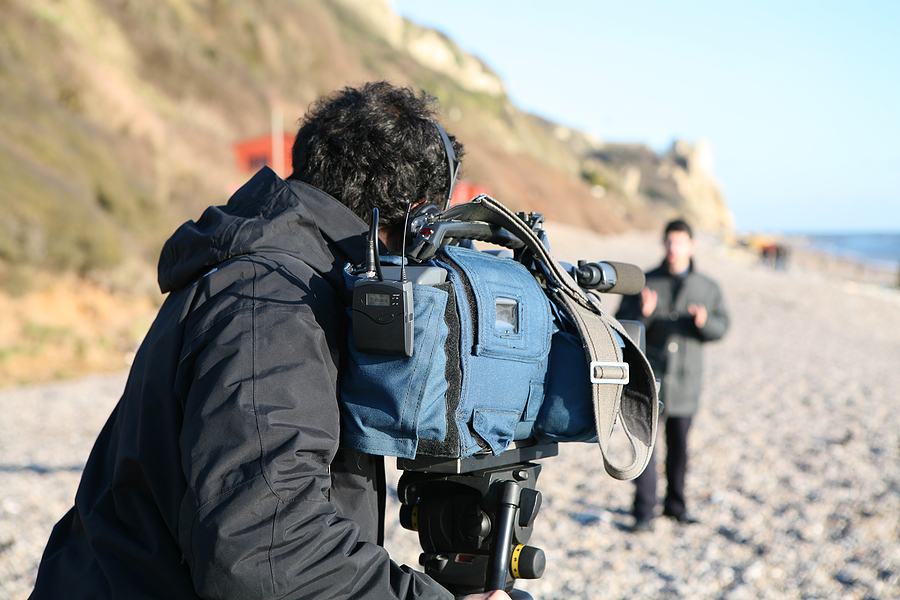So you fancy a job in TV? But just how do you break in to the world of television?  Here Shu Richmond, a TV Executive and Editor of website So You Want to Work in Television, tells the Magazine her top ten tips for landing that dream job…
Here Shu Richmond, a TV Executive and Editor of website So You Want to Work in Television, tells the Magazine her top ten tips for landing that dream job…
BY SHU RICHMOND
So you want to work in television? That’s you and whole lot of other people!
It’s an exciting, varied and stimulating working environment. It is also cut throat, insecure and unforgiving. Permanent jobs are rare and you need to adapt to a freelance career – constantly on the lookout for your next job.
So what should you do if you are determined to enter the TV job world?
1. DON’T ASSUME A MEDIA DEGREE WILL GUARANTEE YOU ENTRY
There is pretty much only one way into TV work and that is from the bottom. Research we did amongst TV employers suggested that while they like to see proof of education at degree level they are not particularly bothered which subject that degree covers.
Media graduates will have to accept that, even with an obvious talent and a fabulous showreel of student films, you will still have to start in a fairly menial position – most likely as a runner. Your media degree may well prove valuable once you are finally given some responsibility and start working your way up the ladder but it won’t necessarily impress employers.
DO NOT give yourself a Producer or Director credit on your CV if it was a student production. In your applications you need to make it clear you are willing to do anything to help a production. Some people are afraid that media graduates will be unwilling to do the menial tasks like making the tea and racing out to buy props!
2. MAKE THE MOST OF YOUR EXTRA CURRICULAR ACTIVITIES
Whether you are at school, college or university make the most of any extra curricular activities that may develop your media skills and provide experience.
Join any clubs or societies that involved television or radio production, journalism, photography, videography or theatre. These are all things that you can add to a CV to demonstrate your enthusiasm and interest in media.
Get involved in hospital radio, your local amateur dramatic society; offer articles to relevant blogs – it all shows a willingness to contribute and to learn new skills.
3. LEARN HOW TO WRITE AND TELL A STORY
Many production roles in TV involve story telling in some way. Whether factual, children’s or drama it’s about communicating information or telling a story to the public. If you want to move up from runner to researcher you will need to know how to find accurate information and be able to present it in an accessible format. If you want to be involved in developing new ideas you will need to know how to write a compelling programme proposal. If you want to make TV shows you are going to have to know how to write a script. Writing skills are essential.
A recent survey stated that media employers are concerned about the lack of traditional journalistic skills – ie finding own stories; use of language; writing and newsgathering. In particular, the standard of written English among new entrants was flagged as a major cause for concern.
Work on those skills!
4. LEARN TO MAKE CONTACTS AND NETWORK
Getting work, and finding the next job once a contract is finished, is a lot about contacts.
If you know anyone with media contacts, tap them up for an introduction.
Join Twitter, follow TV companies and job sites and start talking to media people. It’s as simple as checking out who other TV people are following and following them too! (Check out my media list on my Twitter feed if you fancy: www.twitter.com/ShuRichmond).
Learn the art of networking. Make a note of all contacts details you get and keep in touch.
Send emails to production companies asking for jobs and if you are lucky enough to get a reply – even a no – then reply back to the person thanking them for their response and asking if you can keep in touch in case the situation changes.
DO NOT become a stalker! There is a fine line between keeping in touch to see if the work situation has changed and annoying potential employers with a barrage of emails and calls. Sending a short email to remind someone of your existence and keenness for a job is fine, especially if you have something new to tell them, such as an addition to your CV since you were last in touch.
5. READ THE NEWS, DEVELOP IDEAS & WRITE THEM UP
If you want to get into TV because you enjoy the creative side then prove it by finding and developing ideas.
Ideas are everywhere – books, newspapers, magazines, the internet, that interesting person down the pub. Look around you, work out what the trends are, do some research and gather a portfolio of ideas.
You don’t need to write up a full proposal but showing an ability not only to come up with ideas but also present them will be an asset in job applications. And if you get to a job interview and they don’t ask for your ideas – offer them anyway.
6. MAKE YOUR OWN MEDIA
Are you writing? Are you making videos? Are you learning how people use the web? Are you blogging? Broadcasting podcasts? Are you developing ideas and writing up TV proposals? Are you part of a TV forum?
The technological revolution allows anyone to published their own creativity on the web. What a great opportunity to develop and broadcast your skills.
Here’s an example: a school leaver sent me his CV to look over. He’s had a few work experience placements and looking for that first running job. His CV is naturally sparse right now as he looks for those all-important credits but what really stood out for me was the fact that he had set up a blog – about one of his passions, Formula One. This is a subject of no interest to me whatsoever but it is a clear sign that he is self-motivated.
It also tells me he is writing on a regular basis – which is an essential skill in most production jobs. He can find information, organise it, write about it concisely, source stills, find relevant links. As far as I’m concerned he’s well qualified as a researcher, never mind runner.
7. LOOK IN THE RIGHT PLACES FOR JOBS & BE PERSISTENT
You cannot afford to send out CVs, sit back and wait for an answer. If you really want to work in this industry you are going to have show initiative, be creative and work at it.
There are very many online jobs sites now so sign up to them (I like http://www.theunitlist.com – and it’s free) and start applying.
DO NOT annoy potential employers by applying for jobs you are obviously not qualified to do.
DO contact production companies who are setting up a new production and see if they can offer work experience or a runner job.
Check out all the apprenticeships schemes such as those run by the BBC, C4 and ITV.
Google local TV or facility companies for potential work placements – even getting some experience at a business that hires out camera equipment will get you started on making contacts and learning the business.
8. MAKE SURE YOUR CV SELLS YOU EFFECTIVELY
Write your CV to highlight ANY kind of media experience you have, whether contributing to university radio or writing the in-house college newsletter.
Make your passion for TV obvious but don’t be self-obsessed. Explain how your talents and skills can help an employer rather than bang on about how brilliant you. They want to know that you are willing, enthusiastic, friendly and not afraid of menial hard work!
DO NOT put your educational qualifications at the top of the CV. Employers skim through very many CVs and you need to make sure you hit them with your key skills first – tell them what you can do that will help them (ie operate a DV camera, write briefs, IT skills etc).
Next up on the CV should be relevant work experience.
DO NOT bother with a mission statement that tells them you they can do for you (ie “looking for a company that will help me develop my excellent creative skills”)
9. BRUSH UP YOUR PERSONAL AND SOCIAL SKILLS
Quite possibly more important than a degree are good personal and social skills. So much of working in television is dealing with other people – members of the public, presenters, contestants, your fellow team members, celebrities – and employers are looking for people who can communicate effectively, who are likeable, enthusiastic and hard-working.
It is a fact of life than someone less qualified for a role can end up getting the job purely on their social skills – they way they present themselves to other, and particularly of course in an interview. I’ve seen people who aren’t particularly good at their job moving up the career ladder as a result of their excellent social skills!
This doesn’t mean you should start trying to be someone you are not but do make the effort to be polite, charming, interested and engaging.
If you are nervous about interviews, ask a friend to role-play an interview with you to get you used to the situation.
10. MAKE SURE YOU KNOW WHAT YOU ARE APPLYING FOR
Get as much practical information about the TV workplace as you can – the main employers, the different roles and different genres of programming-making.
Do research on the different roles in TV if you don’t already know. Skillset outlines media job roles and there are plenty of informative case studies on my site that tell it how it really is.
If you are applying for a job make sure you research the company before you do, especially if you are going for an interview.
DO NOT send a CV to a company that makes drama telling them how much you want to get into factual TV.
 Shu Richmond is a Freelance Executive Producer, Media consultant and founder editor of website www.wanttoworkintelevision.com. Shu has over 20 years experience developing, launching and producing new TV shows. Her credits include Editor of ITV’s award-winning daytime show, This Morning, successful reality format, The Villa for Sky 1, novel regression series, Have I Been Here Before? for ITV and numerous travel, cookery and lifestyle shows.
Shu Richmond is a Freelance Executive Producer, Media consultant and founder editor of website www.wanttoworkintelevision.com. Shu has over 20 years experience developing, launching and producing new TV shows. Her credits include Editor of ITV’s award-winning daytime show, This Morning, successful reality format, The Villa for Sky 1, novel regression series, Have I Been Here Before? for ITV and numerous travel, cookery and lifestyle shows.



